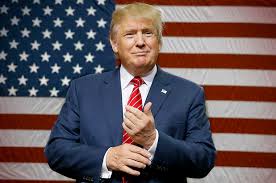Ross Parker was chief of the criminal division in the U.S. Attorney’s Office in Detroit for 8 years and worked as an AUSA for 28 in that office.

By Ross Parker
ticklethewire.com
President Trump is a media magnet, for better or worse. Debates on public policy and personal peccadilloes whirl so fast that it seems fair to step back and try to ignore the daily sensations and make a preliminary assessment of his successes and failures in the law enforcement and criminal justice arenas.
Relations with Law Enforcement Agencies
Candidate and now President Trump often voices an intention of becoming a supporter and partner with police and federal agents. He vocally repeats the warnings from the War on Drugs contingent and openly chose their tenets over Black Lives Matter. He promises more support, financial, executive, and legislative, and he declares new policies and priorities.
The jury seems to still be out on whether these promises are going to be implemented but law enforcement seemed at least open-minded after their general ambivalence for Obama. But Trump’s “buddy” plan took a serious hit in the last few days when he abruptly fired the well respected head of the largest and most influential law agency in the nation, if not the world.
Last week Trump fired James Comey, the Director of the FBI. In the Bureau’s almost 100 year history this had occurred only twice previously: President Richard Nixon fired the director while the nation was in the throes of Watergate, and President Bill Clinton fired William Sessions in 1993, shortly after Clinton took office.

Although Comey had drawn some criticism by his disclosures a few days before the election that the Bureau was re-opening and then re-closing the investigation on candidate Hillary Clinton, most thought that, however misguided, the comments were not intended to affect the election or have any other ill intent. Whether they did or did not doom her election hopes is another subject.
Contrary to Trump’s protestations, Comey was and continues to be highly regarded by other law enforcement agents, Congress, and the public at large. With the men and women of the FBI, the issue is personal.
It was also the way it was done, its peremptory quality, the prevarication and confusion among Trump, his staff and spokespersons. The Director found out he’d been terminated on a TV news program. It was the kind of Amateur Hour we have come to expect from this Administration.
Ironically ,Trump’s firing resulted in the disclosure of his meddling/obstruction of the investigation of fired National Security Coordinator Michel Flynn. Trump’s remarks to Comey about closing the Flynn investigation would probably never have seen the light of day absent the firing. Not the first time Trump stepped on an important part of his anatomy.
The flare-up of violent crime statistics, concern about increasing assaults on police, general ambivalence toward Obama policies—all of these factors provided an atmosphere in which President Trump could have cemented relations with law enforcement. But the Comey affair and Trump’s meddling in several other DOJ cases and policies seem to have made this a lost opportunity for him to build an alliance with law enforcement.
Supreme Court and the Judiciary
Another potentially positive area was in his judicial appointments. From a law enforcement perspective, if the measure of the value of Justices and judges is their tendency to rule for the government in criminal cases, then the selection of Justice Gorsuch to fill Justice’s Scalia’s seat was a big win for Trump.
But the win came at a price. The absence of a Justice for a year meant that the Court was stuck in third gear and could not resolve some important questions which have split the lower courts.
Then, too, the politicization of the selection process and the abandonment of the 60 vote rule in the Senate will impact the process negatively for decades. The emphasis on broad-based excellence has been de-emphasized a notch for a candidate’s predicted loyalty on a few hot-button issues. The fact that we appeared to have gotten a Justice of excellence and integrity in Justice Gorsuch does not entirely absolve the methods and intentions of the selection process.
Moreover, the general dysfunction of both Congress and the White house has, thus far, left hundreds of vacancies for new federal judges and U.S. Attorneys unfilled.
Finally, going back to the original rubric for judging success in this category, there is undoubtedly an undetermined segment of the law enforcement community and the population at large which holds that there is more to assessing success in choosing judges than their predictability for government-favored rulings. Excellence, independence, wisdom, legal acumen, and courage—have these attributes been de-valued by Trump and his architects for criminal justice?
Criminal Justice Reform
For the first time in several decades there appeared to be broad-based, bipartisan support for making progressive changes to the criminal justice system. From Senator Rand to Congressman John Conyers (a wide spectrum indeed), consensus was building toward reform.

But the President and his Attorney General Jeff Sessions are not only opposed to this movement, they apparently want to roll back policy to the get-tough rhetoric of two and three decades ago. AUSAs are directed to seek the most severe charges and sentences in drug and gun cases. Mandatory minimums are back in favor. Prosecutions of marijuana cases in recreational use states have been threatened.
It’s Nixon’s War on Drugs Redux. Even those of us who have consistently opposed marijuana legalizations shudder at the prospect now at sending DEA agents and AUSAs to put the genie back in the bottle.
Trump/Sessions DOJ has also done a 180 on civil rights investigations of local police departments, even to re-examining all existing consent decrees. Many police will welcome the end to what they consider to be obsessive micro-management from Washington. Others, however, found DOJ’s participation to serve as a pragmatic buffer between community groups and the police. Communities like Baltimore considered the decree to be the foundation for a strengthened department.
Trump’s description of a terrible crime wave gripping America paints a bleak picture, particularly in the cities. Some think this rhetoric denigrates the hard work by law enforcement which had resulted in a 42% decrease crime statistics. Still, most agree that violent crime, especially since 2015, continues to be a stubborn and dangerous problem, along with the opioid epidemic. A fresh approach and commitment would be a real achievement by President Trump. So far, however, we have seen only fear mongering and proposals like The Wall and widespread deportations.
The Law Enforcement Leaders, made up of over 200 police chiefs, have made five policy recommendations to the President and Attorney General:
1. Focus on violent crime with DOJ’s priorities and resources.
2. Reduce unnecessary time behind bars. Lock up the worst.
3. More resources for mental health and drug treatment, which cannot be addressed successfully in jail.
4. Build up Community Policing with local programs and information clearinghouses.
5. Reduce recidivism by supporting prison education and treatment programs, residential re-entry centers, and home confinement for those nearing release.
President Trump seems inclined to support the first and part of the third proposals (opioid treatment). His present plan seems inconsistent with the second and fourth, although they would be worthwhile topics for the task force to reduce crime which he has created.
Law Enforcement Budgets
The quickest way to a law enforcement agency’s heart is through its wallet. Two months ago Trump announced that his first budget would include significant increases in law enforcement spending. That, of course, would be welcome news for agencies whose increased costs have not been met by increased budgets. Plus the Administration’s announced expanded expectations will be costly.
The problem is that any budget increases will be met by the pressure to cut spending to justify a tax reduction. So this is another one in the wait-and-see category.
Bureau of Prisons
President Obama cut the federal prison population by about 10% through an unprecedented use of his clemency power, reduced Sentencing Guidelines and legislative changes in sentencing. The result caused the prison overpopulation pressure to ease and almost ended the use of “private prisons.”
None of these policies seem at all likely in the Trump Administration, whose plans will fill the prisons up again and bring back budget and infrastructure concerns. Sessions’ direction for tougher charging and sentencing policies will accelerate this trend. Plus he has announced an intention to reverse Obama’s executive order to close private prisons.
All of this portends a significant increase in the BOP budget. Some, perhaps many, in law enforcement will applaud this result. However, the discovery by criminal justice “reformers” in Congress that these policies have a price tag may well put them in opposition to the President’s plan to lock more miscreants up.
So what’s the verdict on Trump’s early influence on the criminal justice system? Like the rest of his actions, it depends on the point of view of the listener. But, over all, it appears to be something which once held promise but seems to be trending downward. Beyond content and result is the method. There seems to be only limited thoughtful planning and consultation with career experts.
Like much of Trump’s policy pronouncements, it has a shoot-from-the-lip quality.
___________________________________________________________
This is my 100th column for Ticklethewire, a milestone of note only to writers who are “counters.” Whatever the future holds, I want to thank Allan Lengel for his help and indulgence, and to the readers who give me feedback, especially the ones who care enough to disagree.




